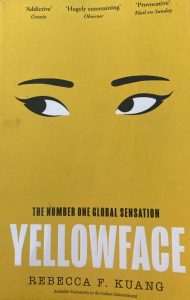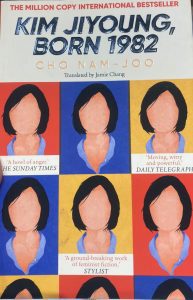Table of Contents
ToggleBook Review
 R.F. Kuang’s Yellowface is a bold and incisive exploration of cultural appropriation, identity, and the inner workings of the publishing industry. At the heart of the novel is June Hayward, a struggling white author who seizes the opportunity to claim the manuscript of her recently deceased friend, the successful Asian American writer Athena Liu, as her own. June’s deceitful rise to literary fame quickly spirals into a series of ethical dilemmas and personal reckonings.
R.F. Kuang’s Yellowface is a bold and incisive exploration of cultural appropriation, identity, and the inner workings of the publishing industry. At the heart of the novel is June Hayward, a struggling white author who seizes the opportunity to claim the manuscript of her recently deceased friend, the successful Asian American writer Athena Liu, as her own. June’s deceitful rise to literary fame quickly spirals into a series of ethical dilemmas and personal reckonings.
Told through a gripping and fast-paced narrative, the novel delves into the complexities of race, authorship, and ambition. June is a compellingly flawed protagonist, representing the darker sides of creative aspiration, while Athena, though absent, remains a powerful symbol of marginalized voices that are often co-opted or silenced.
Yellowface reads like a literary scandal unfolding in real-time—both thrilling and unsettling. It mirrors the obsessive draw of online controversies, inviting readers to confront uncomfortable truths. Kuang addresses urgent themes such as racism, cultural theft, and the politics of who gets to tell which stories. Her critique of the publishing world is sharp and unrelenting, revealing the systemic barriers faced by authors of color.
The novel also interrogates the notion of identity and narrative ownership, raising pressing questions about authenticity and the consequences of erasing lived experience. Kuang’s prose is both darkly humorous and intellectually rigorous, blending social critique with engaging storytelling. Her background as a historian enriches the novel with nuanced cultural insight and meticulous detail.
Both June and Athena are portrayed with depth and complexity—June’s moral grayness drives the plot, while Athena’s legacy unfolds in layers, gradually revealing a fuller portrait. The story is filled with tension and surprise, making it a compelling and thought-provoking read.
Ultimately, Yellowface is a powerful and necessary novel that challenges readers to examine their assumptions about race, privilege, and creative ownership. It’s a searing commentary on the ethics of storytelling and a must-read for anyone interested in the intersections of literature and identity.
What I don’t like about the book?
- Anticipated plot twists may diminish the effect for certain readers.
About Author
Rebecca F. Kuang is a Marshal scholar, she has an MPHil in Chinese Studies from Cambridge and an MSc in Contemporary Chinese Studies from Oxford. She now pursuing a Phd in East Asian Languages and Literatures at Yale, where she studies diaspora, and contemporary Sinophone literature and Asian American literature. She is also the #1 New York Times and #1 Sunday times best-selling author of Yellowface, Babel: An Arcane History and the Poppy War trilogy. Her next novel is Katabasis.
Conclusion
“Yellowface” is an impactful and challenging novel that prompts readers to face difficult realities about race, identity, and storytelling ethics. R.F. Kuang delivers a riveting story that critiques the publishing industry and offers a wider reflection on cultural appropriation. It is an essential read for those engaged in modern dialogues about race and literature.





